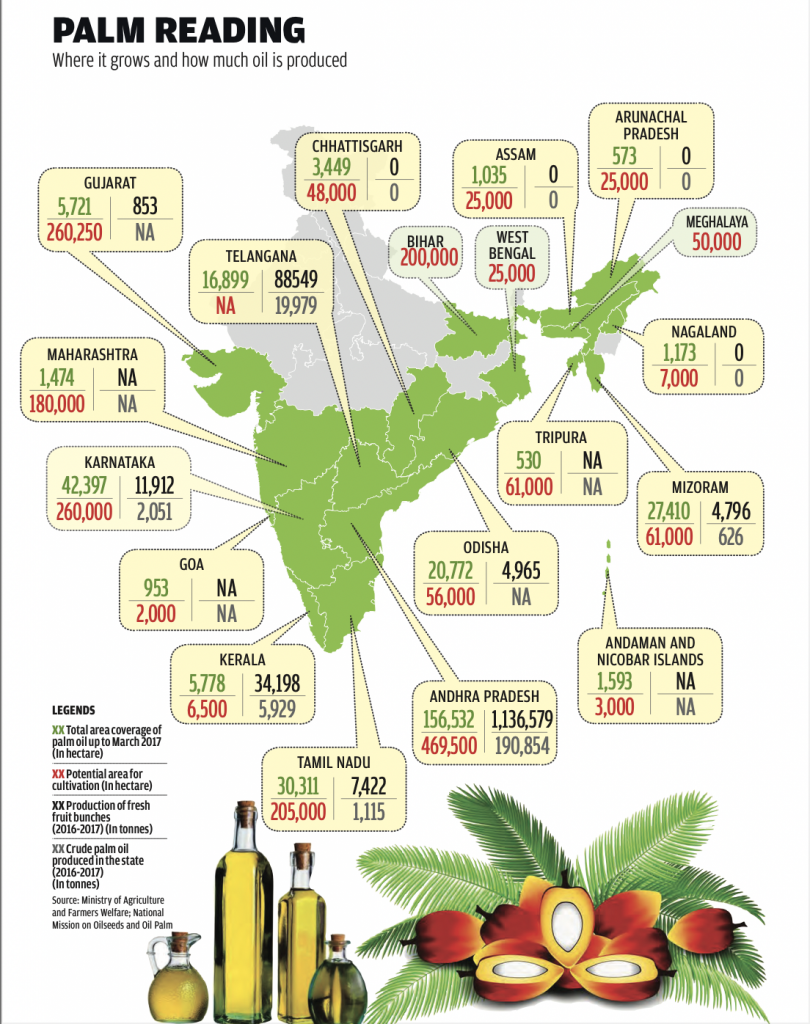What is palm oil and why is it so controversial?
Palm oil is an edible vegetable oil derived from the fruit of oil palm and is the most widely consumed vegetable oil .It is cheap, ubiquitous and is used in thousands of everyday products ranging from ice cream, peanut butter, bread to lipsticks, soaps, and detergents. Brands like Nestlé, PepsiCo, Hershey, Ferrero, Hindustan Unilever, Mars, Kellogg’s, etc. use palm oil; although some brands are committed to using certified sustainable palm oil.

Palm oil has high saturated fat content; however, when consumed in moderation, it does not have incremental risk for cardiovascular health. While palm oil isn’t detrimental to one’s health when consumed in moderation, it is however, quite harmful for the environment. Its cultivation proves to be quite taxing on our already depleting resources, and has a harmful impact on the planet.
Palm oil’s world domination
The increase in production and demand of palm oil can be credited to a few factors –
Palm oil has replaced less healthy fats in the west, it has replaced expensive oils in personal care and home products, it is widely used as cooking oil especially in Asia. Besides this, producers have been persistent in keeping its price low. Additionally, its properties of being perennial and evergreen year round allows it to yield the highest yield per acre compared to any other oilseed crop.
The main issue with palm oil
Oil palm trees are grown only in the tropics and therefore require certain weather and water conditions for their cultivation. To extract this oil, the fruit is collected from oil palm trees which live for an average of 28 to 30 years. In this span however, the tress that grow too high are cut down to make room for more trees, thereby contributing to rainforest deforestation. 8% of the world’s deforestation between 1990 and 2008 was due to huge areas of rainforest being cleared to make way for palm plantation and to meet the extraordinarily high demand for this inexpensively produced oil, resulting in the loss of habitat for already endangered species such as orangutans, pygmy elephants, and Sumatran rhinos.
Besides the environmental issues, palm oil is also believed to have certain detrimental effects on human health. It increases heart risk factors in some people, increases cholesterol levels and increases the risk of atherosclerosis.
Palm oil cultivation in the Indian scenario
Palm oil is mostly cultivated in certain north eastern and southern states in India which have the requisite climatic conditions to support their growth. Andhra Pradesh produces nearly 90% of India’s palm oil, however, this cultivation project hasn’t seen much growth over the past few years. This stagnant growth can be majorly owed to India’s precipitation rate which is at an annual average of a little over 1000mm. This, coupled with poor irrigation systems lay immense strain on India’s water resources, leading to a falling water table. Owing to these unfavourable conditions, India has turned towards importing this incredibly cheap and versatile oil from countries like Malaysia and Indonesia. While this may seem like the cheaper alternative for millions using this oil unsuspectingly, the ecosystems of these Southeast Asian countries are paying the heavy price.

What are the pros of palm oil?
Palm oil is believed to be the best type of vegetable oil to cultivate because it is an extremely efficient crop, i.e., a lot more palm oil per area of land can be produced almost all year round, in comparison to other oil crops such as coconut or soybean oil. It has also been observed that oil palm trees do not require as much pesticides or fertilizers as other crops. Additionally, considering its increasing demand, the palm oil industry provides employment opportunities, especially to the population living in poverty in developing countries. This assurance and low maintenance attracts a lot of growers who can rely on the steady flow of income this crop provides.
Besides this, palm oil is also believed to have certain health benefits and has been credited with providing protection against heart disease, improving vitamin A status in people who are deficient, and having properties which may support brain health.
What is the solution?
Seeing the devastation caused by palm oil’s cultivation, our first instinct might be to cut out palm oil completely. However, searching for an alternative might actually make things worse owing to palm oil’s high efficiency and comparatively less usage of land than other oil crops. Therefore, boycotting palm oil will only lead to the replacement of palm oil with other crops that require significantly more farmland and therefore, more deforestation.
While completely stopping the cultivation and use of palm oil may not be the solution considering its widespread use, what can be done is to ensure that palm oil is cultivated in a sustainable manner, i.e., in a manner where the environment isn’t impacted harmfully. To help check whether a product has used sustainable palm oil or not, the World Wide Fund for Nature (WWF) has come up with a rating tool for brands, to help with the assessment. This tool or scorecard helps determine which brands are committed to sustainable palm oil production. This also proves to be the perfect mechanism for brands to identify opportunities where their policies, operations and efforts towards sustainability can be improved and checks their progress and that of their peers.
The model in which majority of the world is consuming palm oil is far from sustainable. Wealthy consumers are taking advantage of developing countries’ abundant cheap labour and valuable rainforest, which they are ready to part with at a bargain to help them accelerate their economic growth. If this system continues taking its toll on our natural resources and the habitat of already endangered species, we will soon be left with nothing. While trying to bring about a change as an individual might seem overwhelming, what we can do as conscious citizens is to try and support brands that use sustainable and environment friendly mechanisms and ingredients for their products.
In the words of Kris Carr, “Adversity is a call to action, and your freedom lies in taking the first step. Don’t worry about the entire staircase, just take one step, and then tomorrow take another.”
 Food Manifest
Food Manifest 



















Leave a Comment
Your email address will not be published. Required fields are marked with *